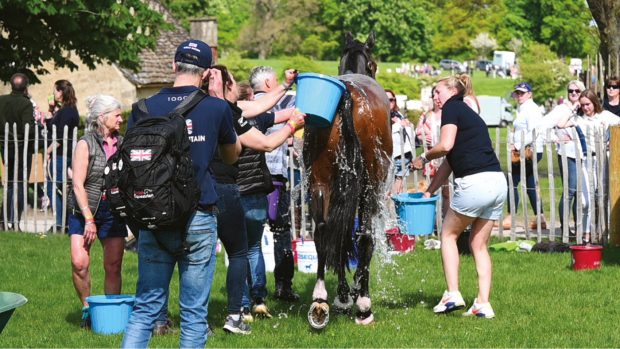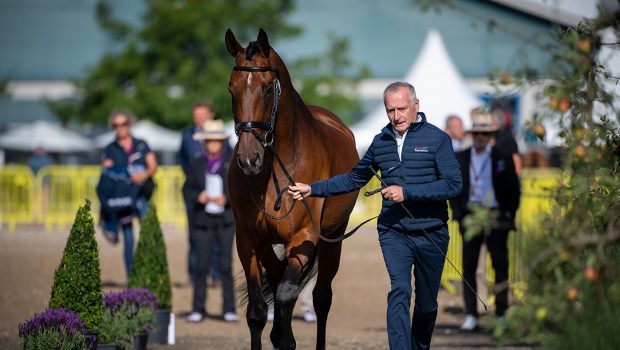A senior figure in endurance who admitted to using a vet’s stamp to falsify horse passports has had his suspension reduced by the Court of Arbitration for Sport – as flaws in the FEI vaccination system are highlighted.
Trainer Pierre Arnould, former Belgian endurance national team leader and member of the FEI endurance committee, used FEI vet Peter Wijnendaele’s old stamp and added a forged signature to four horses’ FEI passports – including Sonschein, who participated in the 2018 World Equestrian Games. In April 2020, Dr Wijnendaele discovered that a Belgian horse’s passport contained his name and stamp, years after 2005, when he had left Belgium. He found further instances of his stamp being used in horse passports, and informed the FEI. In October 2020 Arnould was told of FEI disciplinary proceedings relating to four endurance horses whose passports showed vaccinations between 2017 and 2018.
During a FEI Tribunal hearing in March this year the FEI stated the horse passports were “unlikely” to be the only ones falsified and claimed the organisation had evidence of further cases. Arnould submitted that he had never been subject to any sanction during his equestrian career, highlighted that he was a member of the FEI endurance task force from 2007 to 2009 and argued the case against him was “driven by people motivated by jealousy of his achievements”.
The Tribunal suspended Arnould for 20 months for fraud and conduct that brought the FEI and or equestrian sport into disrepute. He was fined 5,000 Swiss francs (£3,917) and ordered to pay 7,000 francs (£5,485) toward FEI legal costs.
In April Arnould lodged an appeal with CAS, in which he asked for the duration of the suspension and the fine to be reduced. He also asked for the suspension to be postponed, pending CAS’s decision and for the order to be amended to allow him to attend equestrian events as a spectator.
At a CAS hearing on 25 October Arnould argued the sanction was “not proportionate” in comparison to comparable decisions ruled by CAS or the Tribunal. He believed the FEI wanted to “set an example” and “definitively rule him out” from the FEI where he is “influential”. Arnould argued the Tribunal’s decision violated his right of defence because the Tribunal “is not impartial”, the original hearing should have been held in French – his preferred language – instead of English and the decision failed to address any of the legal arguments made by him.
The FEI requested CAS dismiss the appeal in its entirety and order Arnould to pay the arbitration costs as well as a contribution to the FEI’s legal fees and other expenses incurred in connection with the CAS hearing. The FEI argued Arnould had not offered any defence to the charges, adding “it was not even in dispute he knowingly and deliberately falsified the passports”. The FEI said if Arnould wished to claim the horses were vaccinated, he must bear the burden of proving that but he has offered no evidence to support this claim.
The CAS panel stated the main issue to be resolved was whether the sanction and fine imposed on Arnould was proportionate.
“Indeed, the appellant [Arnould] does not deny he knowingly and deliberately falsified the FEI passports, but claims that the sanction is not proportionate in comparison to similar facts before the CAS or the FEI Tribunal,” said the panel.
The panel noted there were no consistent FEI Tribunal precedents regarding the length of suspension imposed upon cases involving similar violations, and found several mitigating factors; it was Arnould’s first violation of FEI rules, and he had successfully passed all veterinary checks at the competitions he attended with the horses, which “highlights the defects of the vaccination system currently implemented by the FEI”.
Neither Arnould or the FEI was able to establish with a “sufficient degree of certainty” the vaccination status of the horses relating to the disciplinary proceedings, and while the CAS panel considered the financial advantage Arnould would have had from avoiding bi-annual vaccinations, this was “much less” than the risk incurred for the welfare of the horses and his own career. The panel understood the importance of vaccinations and compliance with the rules, but said the FEI vaccination system as it currently exists is “insufficiently robust” and “should be improved to make it more reliable”.
“The FEI could impose the use of the vaccination stickers in the horses’ passports, in addition to the stamp and signature of the veterinarian. This would also allow a better tracking of the vaccination of horses and would make the veterinary checks at competition more reliable,” said the panel.
“This system could also be modernised by computerising it. For example, the information relating to the horse vaccination, could be included directly in the horse’s microchip. This would ensure horses are properly vaccinated and that the vaccination is performed by competent veterinarians.”
The panel was satisfied Dr Wijnendaele voluntarily left his stamp with Arnould, and was a very close friend at the time. The vet had previously stayed at Arnould’s home during trips to Belgium and provided two horses to Arnould’s daughter and accompanied her as a groom at the 2014 World Equestrian Games.
The panel partially upheld Arnould’s appeal. The panel ruled his suspension should be reduced to 14 months and considered this to be proportionate and “struck a balance” between Arnould’s conduct, the mitigating factors, the fact he used a vet’s stamp in violation of the rules and that he is an “emblematic figure” in endurance – and therefore responsible for setting an example by complying with regulation. Following the suspension, Arnould may attend FEI events in any capacity. The fine of 5,000 Swiss francs was upheld owing to being “reasonable in light of the procedure”.
You might also be interested in:

Ban for leading figure who falsified horses’ FEI passports

Record ban for endurance rider who committed three doping offences in 12 months

5 reasons why a subscription to HorseandHound.co.uk makes the perfect last-minute gift
Horse & Hound magazine, out every Thursday, is packed with all the latest news and reports, as well as interviews, specials, nostalgia, vet and training advice. Find how you can enjoy the magazine delivered to your door every week, plus options to upgrade your subscription to access our online service that brings you breaking news and reports as well as other benefits.





